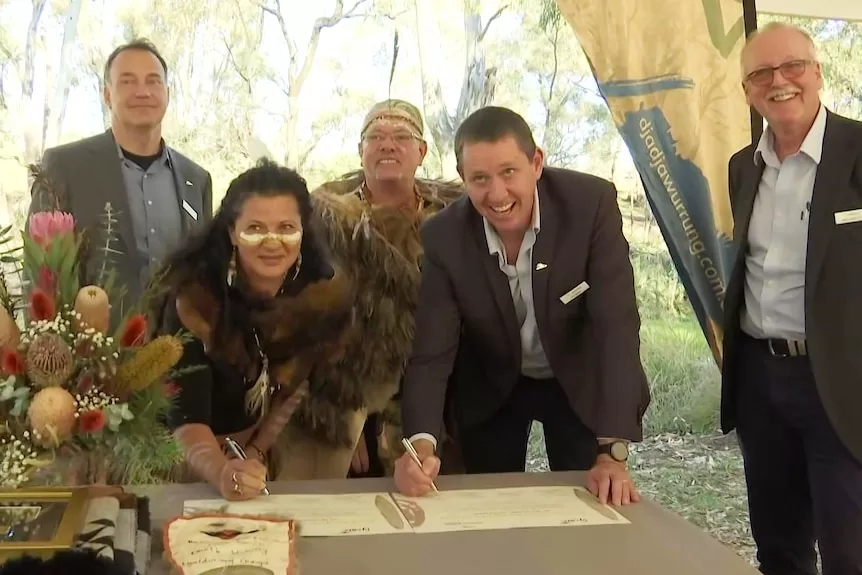Canadian company Agnico Eagle Mines has signed an agreement with traditional owner group Djaara to compensate First Nations people for gold mined at the Central Victorian-based Fosterville Gold Mine.
The agreement — “bakaru wayaparrangu”, meaning “in the middle we all meet” — has been seven years in the making and is being hailed by the two organisations as a first for an active mining company in Victoria.
Mining agreement ‘compromise’
Dja Dja Wurrung Clans Aboriginal Corporation chair Rebecca Phillips represents her ancestors, the Malcolm family line, and said the mining agreement was significant for all Indigenous peoples.
“That’s what this agreement was about — a way of including Djaara people in the resource use of our country and a way for our people and our country to benefit from that,” she said.
“This is a compromise agreement.
“Mining is happening on Djaara country, and this is a way where could meet together to talk about how this could be done in a more fair and equitable way, where Djaara sees some of the benefit and our country receives more of our care.”
Agnico Eagle president and chief executive officer Ammar Al-Joundi said its first agreement with a traditional owner group in Australia follows similar arrangements with indigenous groups at its home base in Ontario, Canada.
The agreement will ensure Agnico Eagle employs Indigenous people at its Fosterville Gold Mine.
The company declined to detail the financial contributions it will provide to Djaara.
“I don’t want to get into specific numbers on that except to say that it’s more than just monetary — it’s employment, it’s business opportunity, it’s training,” Mr Al-Joundi said.
“Quite often it’s confidential. I don’t know within this agreement if it’s confidential or not.”
Agnico Eagle said the Fosterville Gold Mine’s life span is set to end in 2033, and this agreement will give Djaara some influence over the environmental impact of the mine and remediation works after the mine closes.
The CEO of Djarra, Rodney Carter, is also a member of the First People’s Assembly of Victoria that is working towards Treaty with the Victorian government.
He negotiated for and was signatory to the Dja Dja Wurrung people’s native title settlement under the Traditional Owner Settlement Act in 2010.
“Through the wealth sharing we’ll decide and apply that through our own programs and policy,” Mr Carter said.
“We would hope that now we can expand that to better redress social disadvantage.”
Government flags more benefit-sharing agreements
The signing of the partnership at Rocky Crossing in Goornong, near Bendigo, on Monday follows the Yoorrook Justice Commission hearings in Melbourne where Minister for Resources Lily D’Ambrosio said that Victoria’s First Nations people had received virtually no benefit from the $247.4 billion worth of gold mined since 1851.
Ms D’Ambrosio said the Victorian government wanted to see more community benefit-sharing agreements, such as those done with renewable energy groups in the energy sector.
“We are absolutely going to be turning our minds to that. We’re going to be starting some conversations with all parties involved to see what it can look like,” she said.
Ms D’Ambrosio said any future plans for community benefit-sharing agreements needed to hear from industry, landholders, and residents equally.
“I’m very confident that the resources sector and the important role it plays in Victoria’s regional economies, [its] jobs, the broader Victorian economy, can actually bring also benefits. Those two things can sit side by side,” she said.
In 2022, Fosterville Gold Mine’s former owner Kirkland Lake Gold merged with Agnico Eagle Mines.
In 2023, the Fosterville Gold Mine produced 277,994 ounces of gold at Fosterville at a price of $473 per ounce.
Its forecasts for this year show it expects to receive $698 per ounce of gold.
Cultural lessons to inform future plans
Agnico Eagle has the exploration licences to three of the four blocks announced in the North Central Victorian Goldfields Ground Release.
Its vice president of Australian operations, Ion Hann, said there was much more gold to be mined at Fosterville over the next nine years.
He said valuable lessons learnt by Agnico workers, including himself, throughout the negotiation process made it obvious why the agreement was needed.
“As part of our journey [elders] spoke to us about some of the injustices that they suffered, and this is in living generations. That’s not something way down the track,” he said.
This cultural exchange, Mr Hann said, drove negotiations to get to a mining agreement.
“Quite often we’ll start off with a position and we start talking nuts and bolts. But the real gold comes out of those meetings and that is when you start to hear the stories,” he said.
“Every now and again the penny drops and you get why it didn’t seem that important to me, and I get why that’s important to you now.”
Get our local newsletter, delivered free each Tuesday
